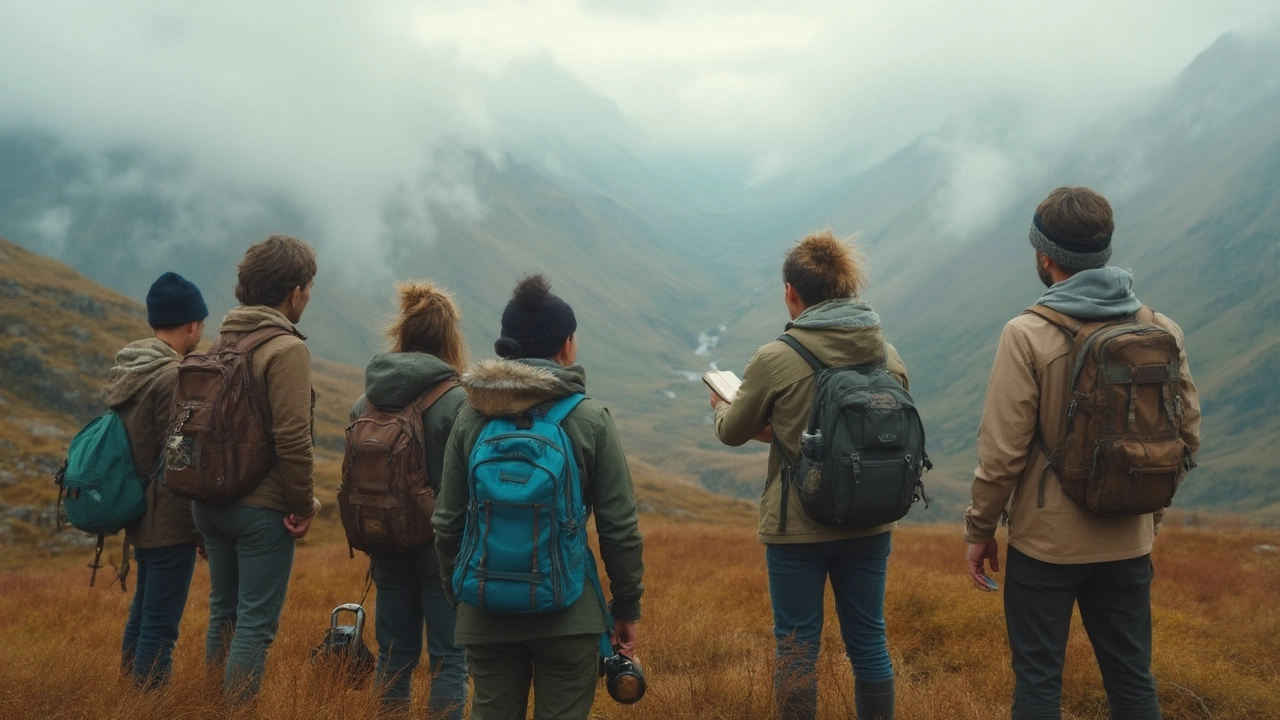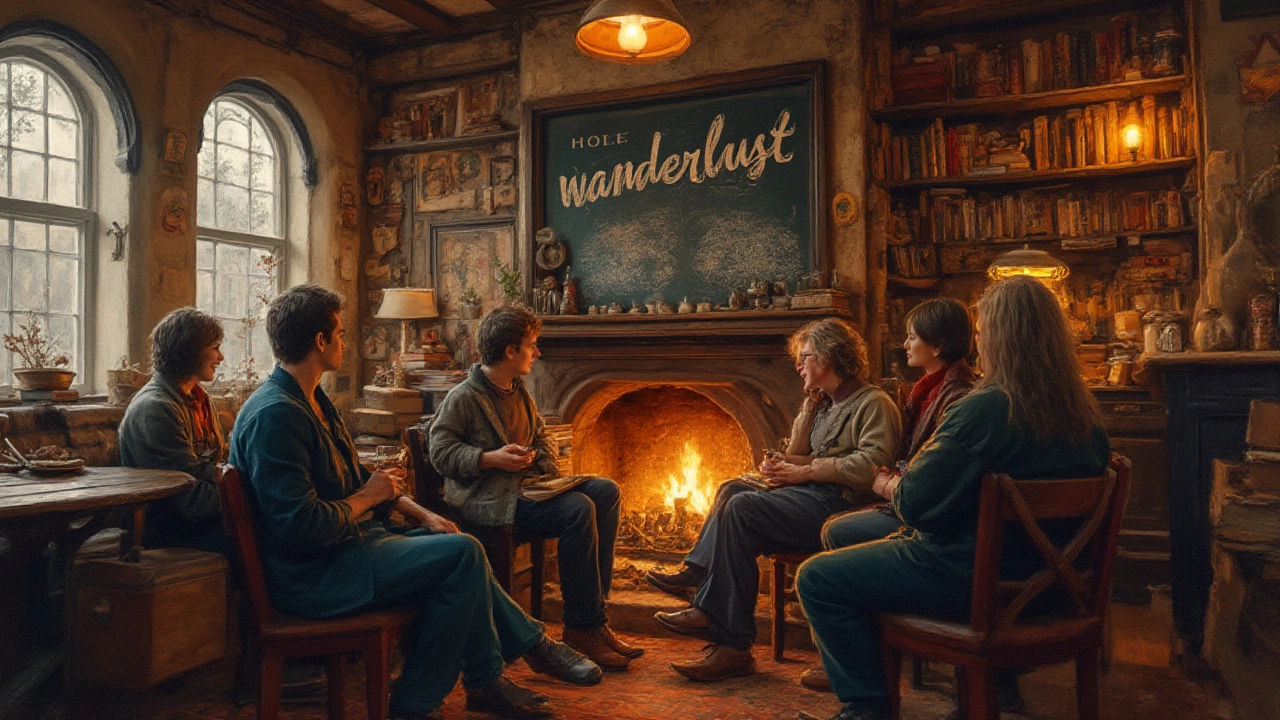What Do You Call a Person Who Loves Traveling and Adventure? Exploring Wanderlust and Adventurer Spirits
 Jul, 13 2025
Jul, 13 2025
You know that itch in your feet when you stare at a map, or the way your pulse quickens as you zip a bag for the tenth time this year? Some people just aren’t wired for routines and office chairs. They crave winding mountain roads, night trains, and passport stamps. While there’s no single word that fits every thrill-seeker or cultural sponge, a mix of names has popped up over the years—each with its own vibe. Let’s dive straight into what we really call these people, what sets them apart, and how their love for travel shapes not only their wallets, but their relationships, happiness, and worldview, using facts, relatable stories, and a dash of attitude.
More than Just Words: Labels for Travel and Adventure Lovers
So what do you call a person who lives for travel and the next adrenaline rush? The classic term is 'globetrotter,' someone who circles the globe like it’s their neighborhood. Globetrotters aren’t just ticking off countries—they’re collecting stories, lessons, and even a few scars. Then there’s the word 'adventurer.' This one’s reserved for people who say yes to things that would make most of us pause—think free solo climbers, Antarctic explorers, or those who travel with nothing but a backpack and a one-way ticket.
But let’s not overlook 'wanderluster' or simply 'travel lover.' The internet popularized 'wanderlust,' a German mashup of ‘wander’ (to walk) and ‘lust’ (desire). It’s the best word for that pull you feel when you see a stunning landscape photo and instantly want to be there. Urban Dictionary calls a wanderluster someone who gets high on planning the next getaway. All these words hint at something deeper than just vacation enthusiasts; they’re about needing adventure like air.
Still, these folks don’t form a one-size-fits-all crowd. Someone may love tracking gorillas in Uganda; another, sampling dumplings on every continent. Some call themselves 'explorers,' especially if they go off-grid or chase little-known destinations. Others prefer 'road warriors' if most of their adventures involve epic drives. And for those always volunteering abroad, you’ll hear 'humanitourist.' There’s even a quirky term, 'fernweh,' which means 'farsickness,' the exact opposite of homesickness. It’s that ache to be somewhere else, anywhere else. Travelers and adventurers often identify with more than one label—mix and match to fit your flavor of boldness.
You might think constantly traveling makes folks loners, but the opposite is true. Globetrotters build global networks and often feel at home anywhere. A study by Booking.com in late 2023 found that regular travelers are 17% more likely to have friends from other continents. Also, people who adventure more report higher satisfaction in relationships. Adventure psychologist Emma Barrett writes that shared experiences—even scary ones—bond people more than gifts or routine dates. Is it any wonder that so many couples thrive on road trips and hiking the Andes together?
While some people just hit the road for a break, the true travel lover or adventurer turns each trip into a quest—a hunt for an unforgettable moment. And they’re not just chasing places. Curious by nature, these people usually jump into new languages, foods, and cultures. They’re often the kind of people who keep a travel journal, just to record those bizarre hostel tales or the recipe for that amazing mango curry from Sri Lanka. But they’re not immune to challenges. Travel isn’t all sunsets and Instagram-worthy meals. True wanderers have weathered airport strikes, food poisoning, and plans gone hilariously wrong. These stories become badges of honor in their personal mythology.
The labels keep growing. In the last couple years, TikTok and Instagram have spun out micro-genres: 'digital nomad' for workers who blend business with border-hopping; 'soul searcher' for travelers seeking inner growth; 'weekend warrior' for those squeezing every mile out of city breaks; 'eco-traveler' for those who don’t just love adventure but want to protect the planet, too. Lately, even 'experience collector' and 'moment hunter' are catching on in social circles. The right label is whatever fuels your own story—and maybe helps your friends understand why you keep texting, "Let’s go somewhere wild."

What Powers a Travel Lover’s Obsession?
You ever wonder what makes some people buy plane tickets on impulse while others save for a living room couch? Scientists actually studied this. The pull to roam isn’t random—there are genes linked to wanderlust. A study from UC Berkeley pinpointed the DRD4-7R variant, which appears more in people who traveled far from their ancestors’ homes. Biologists call it the 'adventure gene.' If you feel restless when stuck in one place, you might just be wired for it like your Neanderthal great-grandpa chasing wooly mammoths. People with this gene variation show higher openness to new experiences and often cope better with uncertainty or novelty—two things travel throws at you every day.
It isn’t all genes, though. Think about how travel and adventure give you an adrenaline kick. Going somewhere new nudges your brain to release dopamine—that happy chemical. There’s also the sense of freedom—nobody telling you what to do or where to go next—and the magic of spontaneity. These highs are tough to explain to homebodies, but science backs them up. According to a 2024 Expedia survey, 74% of regular travelers said that exploring unknown places makes them feel truly alive. That’s even higher among solo travelers and backpackers. Add the surprise element—not knowing who you’ll meet or where you’ll sleep—and life feels less predictable, more electric.
So, what else pushes travel lovers to keep moving? It usually starts with a curious mindset. Young kids ask, "Why does that river bend?" or "What’s over that mountain?" And some of us never lose that. Travelers and adventurers stay hungry for difference: exotic cuisines, new music, and fresh faces. This curiosity makes challenge-seeking fun rather than scary. The travel lover becomes obsessed with discovery, not just destinations. Even when things get tricky—missed flights, monsoon rains, cultural mix-ups—they thrive figuring it out on the fly. That adaptability turns even small problems into personal victories.
Then, there’s the link to personal growth. You won’t find many seasoned travelers who haven’t been changed by adventure. Dropping yourself into new cities, weird hostels, or rugged deserts forces you to adapt, be humble, and question old assumptions. According to the 2021 World Happiness Report, people who prioritize experiences over possessions score higher on life satisfaction tests. Did you know frequent travelers tend to score 24% higher in their ability to solve complex problems than people who stay home? Something about navigating metro systems in five languages and negotiating food prices sharpens your brain in ways textbooks can’t.
The benefits go beyond brain power. There’s the boost to confidence. Think back to the first time you dared to eat something, climb something, or say 'yes' in a foreign language and the sky didn’t fall. Each little challenge builds resilience. For women especially, solo travel can literally change the game. According to Travel + Leisure, over 64% of solo travelers today are women. Huge, right? These same women report less fear and more independence back home after braving cities like Marrakech or Hanoi solo.
And don’t forget the health perks. Moving from place to place, hiking volcanoes, trying street food, or just navigating markets means staying active as part of daily life. Data from the Journal of Transport & Health showed that frequent travelers reported 27% fewer sick days annually, likely because of flexible routines and more daily steps. It’s not only movement; shifting time zones and routines keeps your brain and body waking up, hard to sink into a rut or burnout.
The environmental impact can’t be ignored, but the new breed of adventure lovers is tuned into this, too. More are choosing trains over planes, slow travel over jetting around, and offsetting carbon footprints by joining conservation projects or choosing green accommodations. There’s even a trend called ‘flight shame’ in Europe, where travelers prefer sleeper trains and buses, proud of burning less fuel. So, loving travel doesn’t mean being careless; it just means recalibrating how you adventure.
| Fact / Study | Statistic / Detail |
|---|---|
| Booking.com (2023) | Travelers are 17% more likely to have global friends |
| Expedia Traveler Study (2024) | 74% say new destinations make them feel alive |
| World Happiness Report (2021) | Experience-seekers rate 22% higher happiness |
| Travel + Leisure (2023) | 64% solo travelers are women |
| Journal of Transport & Health (2022) | Frequent travelers have 27% fewer sick days |

Signs You’re a True Explorer—and Tips for Living the Adventure
How do you know if you’re a born explorer or just a casual tourist? You probably don’t even need a quiz. If you’re the person who turns a layover into a city tour, packs more memories than souvenirs, or takes food recommendations from taxi drivers, you might be a full-blown travel lover. But there's more depth to this spirit than just flying often or collecting stamps.
Here are a few *real* signs you belong in the travel-loving, adventure-chasing crowd:
- You’re always researching cheap flights travel lover deals, even if your calendar is clear.
- You know three ways to make coffee without electricity, picked up from random guesthouses.
- ‘Home’ feels more like an idea than a place.
- Friends expect wild stories from you after every weekend away.
- You’ve learned to order food or ask for help in at least seven languages.
- Your playlists are stuffed with artists from four continents.
- Packing light isn’t a challenge, it’s a point of pride.
- You crave learning—food, dances, crafts—straight from locals.
- Traveling solo isn’t scary; it’s your version of therapy.
- You laugh about things that go wrong, knowing that’s what becomes a story.
If you checked off a few, this lifestyle fits you like an old hiking boot. So how do you get the most out of it? Here are some next-level tips for travel lovers and adventurers who want to deepen their game, not just clock kilometers:
- Follow your curiosity, not Instagram. Sure, the blue lagoons and mountain shots are gorgeous, but the most personal trips start with something that nags at you. Maybe it’s a dish you’ve always wanted to taste or a festival you spotted in a travel doc. Build your travels around a passion, whether that’s vintage trains, wildlife, or local crafts.
- Embrace slow travel. Stop treating every trip like a checklist. Pick one country, one city, or even one neighborhood and let yourself get bored. That’s when real discoveries show up. Long chats with café owners, the best secret noodle shop, a buddy-for-life you meet at the laundromat—it’s all hiding in the white space between Instagram moments.
- Pack smarter, travel lighter. Veteran travelers swear by it, and data backs it up. Less stuff gives you space for souvenirs and more freedom to move spontaneously—no waiting for lost bags or paying for checked luggage.
- Learn basics of the local language in advance. Even if it’s just greetings or gratitude, it draws smiles and opens doors. Science shows that brains who pick up bits of a language feel more confident and make better memories on the road. Three words: phrase book app.
- Prioritize eco-friendly choices. Travel changes you, but it shouldn’t wreck the places you visit. Use public transport, skip unnecessary plastics, and book eco-certified places when you can. It’s doubled in popularity since 2020 according to Booking.com.
- Keep a travel journal or photo diary. Not for likes or followers, but for yourself. Photos fade; memories of taste, sounds, and emotions shape who you become.
- Make real friends, not just connections. Saying yes to new experiences, group hikes, or meals with locals often leads to the kind of friendships that outlast any postcard.
- Give yourself space to try new things—and fail. The awkward moments (like butchering a conversation or getting lost) are the spark for fun stories later.
- Stay spontaneous. Some of the wildest adventures happen when plans fall through. Instead of panic, see it as a doorway to something unexpected.
The best part? You don’t need a millionaire’s budget to be a real explorer. The average cost for a round-the-world trip can be less than a new car if you plan smart, travel off-season, Couchsurf, or volunteer along the way. And technology has made nearly any dream reachable. Apps can translate signs, book rides, and even find safe local homestays. If you’re stuck in a routine (or just feel stuck), booking a solo trip—even a weekend away—can reset your perspective in ways a week of Netflix just won’t.
Bottom line: whether you call yourself a travel lover, an adventurer, a wanderluster, or just a passionate explorer, it's less about the label and more about being open. Open to places, people, problems, and breakthroughs. The joy isn't in reaching the most countries—it’s in letting curiosity drive your compass. And when someone asks what you call yourself, maybe the best answer is “ready for the next adventure.”
